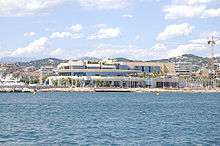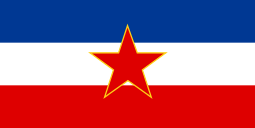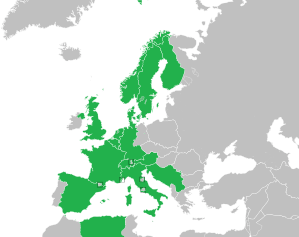Eurovision Song Contest 1961
| Eurovision Song Contest 1961 | ||||
|---|---|---|---|---|
 | ||||
| Dates | ||||
| Final | 18 March 1961 | |||
| Host | ||||
| Venue | Palais des Festivals et des Congrès Cannes, France | |||
| Presenter(s) | Jacqueline Joubert | |||
| Conductor | Franck Pourcel | |||
| Director | Marcel Cravenne | |||
| Host broadcaster | Radiodiffusion-Télévision Française (RTF) | |||
| Interval act | Tessa Beaumont and Max Bozzoni | |||
| Participants | ||||
| Number of entries | 16 | |||
| Debuting countries |
| |||
| Returning countries | None | |||
| Withdrawing countries | None | |||
| Participation map
| ||||
| Vote | ||||
| Voting system | Each country had 10 jury members who each awarded 1 point to their favourite song | |||
| Nul points | None | |||
| Winning song | "Nous les amoureux" | |||
| Eurovision Song Contest | ||||
| ||||
The Eurovision Song Contest 1961 was the sixth Eurovision Song Contest. It was held on 18 March 1961 and was the first to take place on a Saturday night, a tradition that has continued into modern times. It was hosted in the Palais des Festivals et des Congrès located in Cannes, France, where it had been staged two years previously. Luxembourg won for its first time with the song "Nous les amoureux" performed in French by Jean-Claude Pascal. As the contest overran its allocated time, and the show was being broadcast live, the winning song's reprise was not shown in the UK.[1]
Location

The event took place in Cannes, France, with the venue being the original building of Palais des Festivals et des Congrès, after France got the right to host this edition of the Eurovision Song Contest for winning its previous 1960 edition with the song "Tom Pillibi" performed by Jacqueline Boyer. Cannes, a city located on the French Riviera, is a busy tourist destination and known worldwide for hosting the annual Cannes Film Festival, with the Palais des Festivals et des Congrès also hosting the Film Festival. The original building was built in 1949 and was located on the boulevard of Promenade de la Croisette, on the present site of the JW Marriott Cannes. It also hosted the 1959 edition of the Eurovision Song Contest.
Format
Jacqueline Joubert presented the show, having already done so two years earlier in 1959. The stage used for the 1961 Contest was notably larger than in previous years and was decorated with flowers. It is noticeable that during the voting, Luxembourg gave the UK 8 points, and Norway also gave Denmark 8 points. It was the largest amount of points given to a country by a single jury since 1958, when Denmark provided France with 9 points. Such a high number of points obtained by a country wouldn't be achieved until 1970, when Ireland would receive 9 points from Belgium.[1]
Participating countries
A total of sixteen countries took part in the Contest, including the three debuting countries: Finland, Spain, and Yugoslavia. There were no returning or withdrawing countries this particular year.[1]
Conductors
Each performance had a conductor who maestro the orchestra.[2]
-
 Spain - Rafael Ferrer
Spain - Rafael Ferrer -
 Monaco - Raymond Lefevre
Monaco - Raymond Lefevre -
 Austria - Franck Pourcel
Austria - Franck Pourcel -
 Finland - George de Godzinsky
Finland - George de Godzinsky -
 Yugoslavia - Joze Privzek
Yugoslavia - Joze Privzek -
 Netherlands - Dolf van der Linden
Netherlands - Dolf van der Linden -
 Sweden - William Lind
Sweden - William Lind -
 Germany - Franck Pourcel
Germany - Franck Pourcel -
 France - Franck Pourcel
France - Franck Pourcel -
 Switzerland - Fernando Paggi
Switzerland - Fernando Paggi -
.svg.png) Belgium - Francis Bay
Belgium - Francis Bay -
 Norway - Øivind Bergh
Norway - Øivind Bergh -
 Denmark - Kai Mortensen
Denmark - Kai Mortensen -
 Luxembourg - Leo Chauliac
Luxembourg - Leo Chauliac -
 United Kingdom - Harry Robinson
United Kingdom - Harry Robinson -
 Italy - Gianfranco Intra
Italy - Gianfranco Intra
Returning artists
The contest saw the return of two artists this year with the Belgian representative, Bob Benny, who previously participated in the 1959 contest; and Nora Brockstedt, who performed for Norway in 1960.[1]
Results
Scoreboard
Each country had 10 jury members who each awarded 1 point to their favourite song.
| Voting results | ||||||||||||||||||
|---|---|---|---|---|---|---|---|---|---|---|---|---|---|---|---|---|---|---|
| |
||||||||||||||||||
| Spain | 8 | 1 | 1 | 1 | 2 | 2 | 1 | |||||||||||
| Monaco | 6 | 1 | 3 | 1 | 1 | |||||||||||||
| Austria | 1 | 1 | ||||||||||||||||
| Finland | 6 | 1 | 1 | 2 | 2 | |||||||||||||
| Yugoslavia | 9 | 3 | 1 | 2 | 1 | 1 | 1 | |||||||||||
| Netherlands | 6 | 2 | 1 | 1 | 2 | |||||||||||||
| Sweden | 2 | 2 | ||||||||||||||||
| Germany | 3 | 1 | 1 | 1 | ||||||||||||||
| France | 13 | 2 | 2 | 1 | 1 | 4 | 1 | 2 | ||||||||||
| Switzerland | 16 | 1 | 2 | 2 | 1 | 2 | 4 | 2 | 2 | |||||||||
| Belgium | 1 | 1 | ||||||||||||||||
| Norway | 10 | 1 | 2 | 1 | 5 | 1 | ||||||||||||
| Denmark | 12 | 1 | 1 | 2 | 8 | |||||||||||||
| Luxembourg | 31 | 2 | 4 | 4 | 3 | 5 | 1 | 1 | 5 | 1 | 1 | 1 | 3 | |||||
| United Kingdom | 24 | 3 | 3 | 7 | 1 | 1 | 8 | 1 | ||||||||||
| Italy | 12 | 1 | 1 | 1 | 1 | 4 | 4 | |||||||||||
| The table is ordered by appearance | ||||||||||||||||||
International broadcasts and voting
The table below shows the order in which votes were cast during the 1961 contest along with the spokesperson who was responsible for announcing the votes for their respective country. Each national broadcaster also sent a commentator to the contest, in order to provide coverage of the contest in their own native language. Details of the commentators and the broadcasting station for which they represented are also included in the table below.[4]
Voting and spokespersons
-
 Italy - Enzo Tortora
Italy - Enzo Tortora -
 United Kingdom - Michael Aspel[5]
United Kingdom - Michael Aspel[5] -
 Luxembourg - TBC
Luxembourg - TBC -
 Denmark - Ole Mortensen
Denmark - Ole Mortensen -
 Norway - Mette Janson[6]
Norway - Mette Janson[6] -
.svg.png) Belgium - TBC
Belgium - TBC -
 Switzerland - Boris Acquadro
Switzerland - Boris Acquadro -
 France - TBC
France - TBC -
 Germany - TBC
Germany - TBC -
 Sweden - Roland Eiworth[7]
Sweden - Roland Eiworth[7] -
 Netherlands - Siebe van der Zee[8]
Netherlands - Siebe van der Zee[8] -
 Yugoslavia - TBC
Yugoslavia - TBC -
 Finland - Poppe Berg[9]
Finland - Poppe Berg[9] -
 Austria - TBC
Austria - TBC -
 Monaco - TBC
Monaco - TBC -
.svg.png) Spain - Diego Ramírez Pastor[10]
Spain - Diego Ramírez Pastor[10]
All the juries (apart from Austria and the United Kingdom) announced their votes in French.
Commentators
|
|
References
- 1 2 3 4 "Eurovision Song Contest 1961". EBU. Retrieved 2009-02-13.
|first1=missing|last1=in Authors list (help) - ↑ http://www.andtheconductoris.eu
- ↑ "Eurovision Song Contest 1961". The Diggiloo Thrush. Retrieved 4 March 2012.
- ↑ "Eurovision 1961 - Cast and Crew". IMDb. Retrieved 5 March 2012.
- ↑ Roxburgh, Gordon (2012). Songs For Europe The United Kingdom at The Eurovision Song Contest Volume One: The 1950s and 1960s. UK: Telos. p. 259. ISBN 978-1-84583-065-6.
- ↑ Dyrseth, Seppo (OGAE Norway)
- ↑ "Infosajten.com". Infosajten.com. Archived from the original on 18 July 2012. Retrieved 2012-08-10.
- ↑ "Greetje vanavond nummer zes", Nieuwe Leidsche Courant, 18 March 1961
- 1 2 "Selostajat ja taustalaulajat läpi vuosien? • Viisukuppila". Viisukuppila.fi. Retrieved 2012-08-10.
- 1 2 "FORO FESTIVAL DE EUROVISIÓN • Ver Tema - Uribarri comentarista Eurovision 2010". Eurosongcontest.phpbb3.es. Retrieved 2012-08-10.
- 1 2 3 4 5 Christian Masson. "1961 - Cannes". Songcontest.free.fr. Retrieved 2012-08-10.
- ↑ Rau, Oliver (OGAE Germany)
- ↑ "Nederlandse televisiecommentatoren bij het Eurovisie Songfestival". Eurovision Artists (in Dutch).
- ↑ Leif Thorsson. Melodifestivalen genom tiderna ["Melodifestivalen through time"] (2006), p. 34. Stockholm: Premium Publishing AB. ISBN 91-89136-29-2
External links
Coordinates: 43°33′12″N 7°01′20″E / 43.55333°N 7.02222°E

